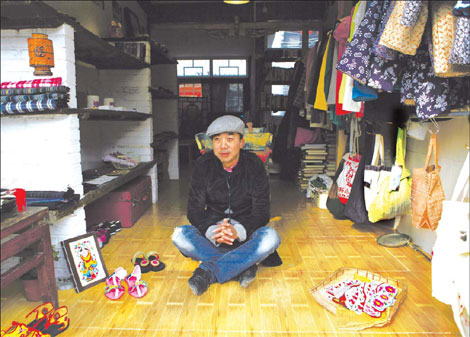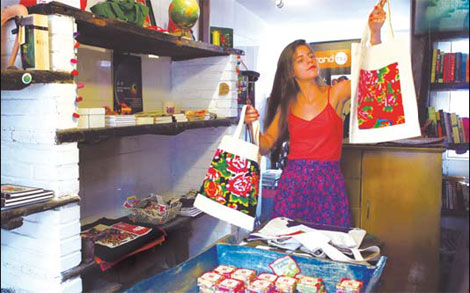Life
Vintage clothing makes a comeback
By Wendy Fung (China Daily)
Updated: 2010-12-29 07:53
 |
Large Medium Small |
|
Nathan Zhang at his clothing and accessories boutique Brand Nu, in a hutong near Lama Temple. Photos by Zou Hong / China Daily |
|
An expat shops at Brand Nu. |
Shopping for cool secondhand clothing is a relatively new concept in Beijing, but its green credentials are winning over converts. Wendy Fung of China Features reports
Clad in a vintage knit cape jacket and artfully clashing lime green socks, Nathan Zhang eats his dinner on a bamboo mat outside his clothing and accessories boutique. The 38-year-old's store is nestled in the hutong near Lama Temple, famous for artsy souvenir stores, coffee shops, a fixed-gear bike and juggling store and even a boutique tanning salon, catering to local hipsters and Western expats.
Zhang's store, Brand Nu, sells urban apparel with a folksy twist: knit gloves, colorful hand warmers and embroidered blouses. Store shelves are stacked with handmade glazed pottery, cloth patchwork wallets and purses hand-stitched by rural artisans. The goal is to sell these handiworks made by a Chinese rural women's cooperative at a fair price.
"I returned to China from Canada, where I saw lots of secondhand shops. I wanted to create a Chinese fair trade style to help those who are less fortunate," Zhang says.
During the Gansu mudslides in August, Brand Nu donated 2,000 kg of secondhand clothing. Zhang's store also became a collection point for residents to donate their used clothing. Brand Nu's efforts produced four truckloads of clothes and children's toys.
Second-hand clothing stores existed before the "cultural revolution" (1966-76), disappeared, but are now making a comeback.
Most second-hand clothing in China is collected by governmental agencies for relief efforts.
West of Brand N is Gulou East Street, the most concentrated hub of vintage and secondhand clothing stores in the city, featuring about 10 stores that sell vintage secondhand apparel.
Three friends who started out working at the same vintage apparel store decided to split and open their own stores. The three new vintage stores are all on the same street.
Underground Kidz, the first of the three stores set up on Gulou East Street four years ago, specializes in selling United States Army surplus gear, vintage leather and denim jackets, Fruit of the Loom T-shirts, Schott coats and original Adidas sportswear.
Its owner, Hao Liu, 30, used to be in a punk rock band and started to import large quantities of hard-to-find used leather jackets and Levi's jeans, in order to introduce Chinese youth to secondhand shopping.
"It's like being in a band - I don't really care about being successful. It's not just about the money," says Liu, who also owns a nearby electro bar.
Like Zhang, Liu says donating secondhand clothing is a way of reusing natural resources while helping those in need. He occasionally mails packages of secondhand clothing from his store to victims of natural disasters and students in rural China.
Nearby is Tiger Vintage Store, which opened earlier this year and carries menswear. Neat racks of Wahler green army shirts, Schott leather jackets, colorful holiday knit sweaters from the 1980's and neon puffy vests line the inside of the store. Tiger's owner, Zheng Yongxiu, 27, surveys his store from behind a counter, wearing a black motorcycle jacket.
"We primarily sell what I like," Zheng says of his product line.
Zheng agrees that buying and selling good quality secondhand clothes is environmentally responsible, but he adds he is not in the business of saving the environment, and does not donate secondhand clothes to charity.
"Why donate when I can sell 100 per cent of my store's clothing?" Zheng asks.
A few blocks away is the new Mega Mega Vintage. It sells mostly female secondhand apparel: Japanese floral skirts; wispy, sheer blouses; tailored, 1950s vintage dresses and wool cardigans with beaded detailing.
The fitting room is an English red telephone booth and stacks of old books and leather suitcases are piled against the walls, while Japanese and Spanish tunes play in the background.
The store's owner, Ke Liu, 25, says he wants to spread the culture of secondhand vintage fashion on the mainland.
"Developing the market is difficult and tiring, as with each new client I have to explain the concept of secondhand shopping," he says.
Three years ago, he donated piles of used clothing to a local nonprofit organization that promised to donate the clothing to villagers who live on the outskirts of Beijing. But he learned the "nonprofit" was actually profiting from selling the donated clothing, which explains his distrust of local nonprofits or start-up nongovernmental organizations (NGOs) that claim to be charities.
Even so, Nathan Zhang of Brand N believes stores like his can make a difference. This year, he joined forces with a local nonprofit called Tong Xin Hu Hui, which works with migrant populations, to donate truckloads of secondhand clothing to rural migrant workers.
Wang Dezhi, a representative of Tong Xin Hu Hui, says the government has turned a blind eye for now regarding his organization's partnership with Brand N.
Regulations do not explicitly allow or forbid NGOs to donate used clothing, but because the Ministry of Health does not inspect the sanitation standards of the donated clothes, it is does not formally approve of the system.
"It's a loophole in the system that's not yet developed. A bit of 'don't ask don't tell'," Wang says.
Nathan Zhang says attitudes will change in the near future.
"I think it's a process and it will take some time in China for people to accept the concept of secondhand shopping, to save the environment and donate their clothes to local charities," he says.

